Bryan Caron's Blog, page 19
October 18, 2016
Word Counts and Why They Don’t Matter

It happens quite often. I’ll come upon a post on Facebook or Twitter of an author referencing word counts in some way.
How many words are too many words?
What’s the correct word count for ?
How many words should there be per chapter?
Should I split my book into two to keep the word counts down?
I have to add/shave ‘x’ amount of words to reach my target number.
This ominous pressure to land the perfect word count for a book or genre for the sheer purpose of writing the “perfect” book really ruffles my feathers. There tends to be a big misnomer out there that if a book in a certain genre is too long, no one will read it, or if a book is too short, readers will think they’re getting jipped. Now, I’m sure there are plenty of readers out there who hate books that are longer than a certain number of pages, or won’t fork out $0.99 for a short story, but the majority of readers, I’m sure, care more about reading a good, strong, compelling story as opposed to how long it may or may not be. And though many a teacher may agree and profess that word counts are the end all, be all of writing, I’m from the school that word counts do not matter one iota. And I’ll tell you why.
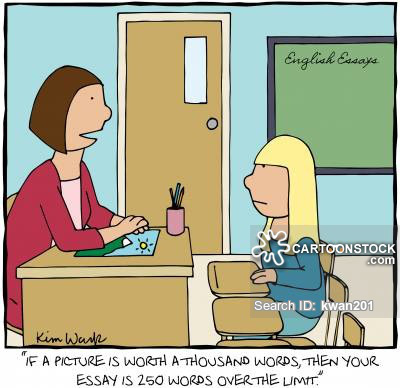
Stories have no limits.
It’s that simple. For any type of writing to be “perfect”, it has to be organic. Of course there are general rules that must be adhered to in order to write successfully, but stories are fluid creatures; as a writer you never know how long a story needs to be until you tell it. Stamping a strict word count on a story in any form before you’ve even written a word limits your ability to create freely. You simply lock yourself in a cell and strap a chain around your creativity, raising self-imposed barriers that keeps your story from being what it’s meant to be. And in turn, yourself from being the writer you’re meant to be.
How many times have you been told to be yourself? That you can’t allow anyone to keep you from pursuing or reaching your dreams? We’re all unique and no one should be allowed to dictate how to dress, or what music to listen to, or what food to eat? So why then, would you tell your stories they have to stick to a particular word count? By doing so, you run the risk of losing the voice that makes you different, that makes you unique, that makes your story unique. There are hundreds of thousands of books published each year. How do you expect to be noticed if you’re simply following in the same line as thousands of others?
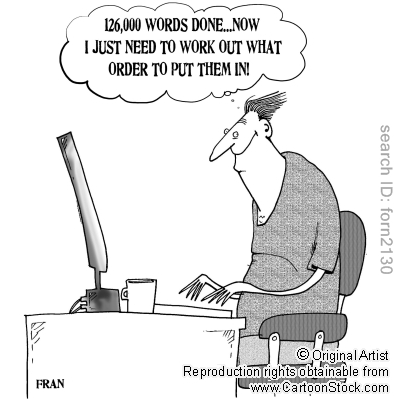
Here are a couple of basic examples:
You “accidentally” write 40,000 words more than you planned. Editing cuts out about half of those words, and cutting your babies shaves it down a little more. But there’s still a lot to cut to reach your “magic number.” So now you start cutting things out that may matter more than you realize. You’ll see this a lot in film, where a studio forces a director to cut a film down to a certain length. The theatrical release is fine, but then you come across the director’s cut of the film and notice how much better it is. That original vision was hurt because the studio felt the length had to be something the film wasn’t. It needed more time to speak and breathe.
Then there’s the flip side, where you do everything you can, but the word count still comes up short of your preferred length. Now, you’re left to shove filler into the book to reach your plateau. But how many times have you watched a television show where certain episodes feel like nothing but filler? It’s because the studio wants to produce a set number of episodes per season, yet the story the writers have to tell doesn’t need that many.
And this idea isn’t limited to entire books. Chapters run the same risks when adding an arbitrary word count. A chapter, essentially, tells its own confined story. Each one is meant to have a beginning, middle and end, and should in some way move the story forward. Why is it, then, that you would think every chapter is going to be exactly the same? Whether a chapter needs just 10 words or half the book, so be it. Forcing yourself to balance your chapters with the same number of words stifles ingenuity.

Editing, changing, cutting and adding are all part of the editing process, and there’s nothing wrong with that — when you’re doing it for the sake of story, meaning or character. Whether it’s 100 words or 1,000,000, if you’ve allowed your story to speak for itself, on its own terms, readers will be much more open to reading it, simply because you haven’t forced it to be just another in a pile of conformity.
So tell me: have you ever worried about word counts to the detriment of your book?








September 25, 2016
Movie Mayhem – Storks
“Where do babies come from?”
For a long time, many parents have dreaded that very question from their younglings. One of the most well-known answers may well be, “The stork.” Where this little white lie originated is actually pretty fascinating once you start reading up on it (beginning with Greek mythology, where storks actually stole babies, to Hans Christian Anderson’s folktale, “The Storks,” about delivering babies to families with good children and dead babies to those with bad children… old-school fairytales — gotta love ’em!), but regardless, it’s used now to quell a child’s imagination until they’re old enough to know the truth. Storks, the new animated tale about this very topic, takes this interesting idea and creates a very lovely, imaginative story that dives deep into some well-meaning and effective metaphors.

Storks — Directed by Nicholas Stoller and Doug Sweetland; Starring the voices of Andy Samberg, Katie Crown, Kelsey Grammer, Jennifer Aniston, Ty Burrell, Keegan-Michael Key, Jordan Peele and Danny Trejo
Babies, according to writer/director Nicholas Stoller, aren’t only an extremely difficult “product” to transport, but they’re also deadly in their cuteness, causing anyone — including storks — to be driven mad with attachment over their little bundles of joy. When one stork (voiced by Danny Trejo) does just that, accidentally destroying the GPS beacon that tells the storks where to deliver the baby (thus breaking their one and only rule of making every delivery), Hunter (Kelsey Grammer) stops the production of babies to begin delivering packages for a huge corporate conglomerate known as Cornerstone.com. It works wonders for eighteen years, but when Hunter is ready to pass the reigns of boss over to the stork’s best delivery… bird… Junior (Andy Samberg), there’s just one small item they need to take care of before that happens: Orphan Tulip (Katie Crown).
Tulip (“Orphan” makes her heart hurt), it turns out, is the baby that never got delivered and was raised by the storks. But now that she’s eighteen, it’s time to “liberate” her and send her on her way. Which is a good thing, since she tends to wreck all kinds of havoc, effectively causing sales to plummet whenever she tries to help in any way. Instead of firing her like he’s supposed to, though, Junior sends her to work in the letter sorting department, a now defunct branch of the company. Little does he know that in a small suburban town, a young boy, Nate Gardner (Anton Starkman), comes across one of the stork’s old flyers and writes to them for a new baby brother. This very letter is accidentally placed in the baby-maker, forcing Junior to join forces with Tulip to deliver the baby before Hunter finds out what happened.
The overall plot is well-told, refraining from sidestepping too much into off-beat territory as Junior and Tulip go through their series of misadventures, which includes an amusing Inspector Gadget-inspired wolf-pack (my particular favorite is the wolf submarine) that want to keep the baby for themselves, and a pack of kidnapping Penguins that commit themselves to a marvelously executed “silent” battle with Junior and Tulip after they finally get the baby to sleep. The majority of jokes — which include a lot of cleverly placed meta references to cartoonish situations and plot twists — hit just the right notes, keeping you invested in the growing relationship between the pair during their quest to deliver the baby to her rightful home.
What’s most impressive about the film, though, is the delivery of the story’s emotional impact. It’s very understated, layered in a nuanced subtlety. One of the reasons Hunter gives for stopping the delivering of babies is that there are other means for which parents can receive a child. Now, depending on your point of view, and what messages you pull from the dialogue and the story itself, this statement might be taken in a couple of different ways. But the way I saw it, the storks come off as a sort of adoption agency, delivering babies to couples who can’t have a child biologically. As evidenced by their marketing, the storks were there to bring joy to the lives of any couple who want a child of their very own. So when the storks stop production on babies, these couples have no other access to becoming parents.
There’s also a secondary layer conveying the intricate dynamics of family that plays into the adoption aspect of the film very well. You don’t have to be blood to be family. Heck, you don’t even have to be the same species to be a family (and I’m sure there are a lot of pet owners would agree with that statement). This idea has a strong impact in the development of Junior and Tulip’s relationship, turning their very unorthodox partnership into a family.
But more than that, Storks is about cherishing the time you have with your kids. Nate’s parents, Sarah ad Henry (Jennifer Aniston and Phil Dunphy… er… Ty Burrell, respectively) are workaholic realtors who have very little time to get off their bluetooths to spend with their son. It’s the reason he wants a little brother so badly; he just wants a best friend to play with. After informing them of what he did, Sarah and Henry finally wake up to their subconscious inattentiveness and help him develop a very intricate landing pad playground around their home. Sarah and Henry know the storks no longer deliver babies, but they are willing to go along with the idea because they finally understand how important this time is to bond with their son.
With so much going on under the hood, the colorful world of Storks becomes icing on a cake that isn’t without its flaws (the annoying pigeon Toady (Stephen Kramer Glickman) comes to mind as one huge dud of a character), but is relateably sweet and delicious, and delivers the goods we didn’t know we wanted.
My Grade: A
Take Our Poll
——————————————
Next week, new movies include Deep Water Horizon, Miss Peregrine’s Home for Peculiar Children and Masterminds. If you would like to see a review for one of these, or any other film out next week, please respond in the comments below.








September 22, 2016
Love It or Hate It — The Written Word Was Meant To Be Interpreted
I’m going to say something possibly unpopular and perhaps a bit strange. I hate the children’s book The Giving Tree, even though oddly, it was my favorite book. I remember being five and reading the story and just weeping for the tree, feeling devastated. Understanding what she was feeling. I recall hating the boy and the self-centered […]
via Why I Hate “The Giving Tree”–But How This Story Makes Us Better Writers — Kristen Lamb’s Blog








September 20, 2016
Chaos Breeds Chaos 2016 Television Awards – Part 3
You’ve read Part 1 and Part 2, so why stop there? Below are my final awards for the 2015-2016 television season.
Best end to a long-gestating story arc: Haven
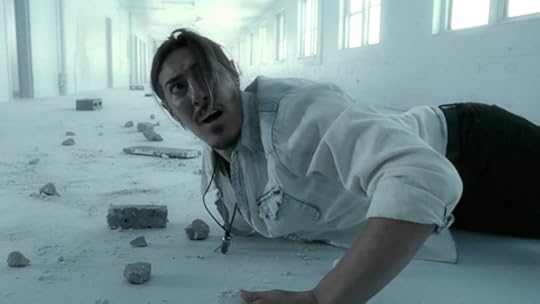
Haven — SyFy
A few seasons ago, Haven started an arc that a guardsman was going to kill Duke Crocker (Eric Balfour). It was the ignition to a full season, in which Nathan (Lucas Bryant) went undercover to find out who it might be and stop them. The arc led to several other story lines, but in the end, Duke’s mysterious killer was never found and the arc seemingly slipped through the cracks. That is, until the season finale, when Nathan was forced to kill Duke to keep Croatoan (William Shatner) from collecting all of the troubles he’d trapped inside him. It was a fitting end to a long forgotten story arc, proving to fans that the creators of Haven were doing everything they could to wrap every loose end in a nice little bow before signing off for good.
Best Previously On Segments: BrainDead
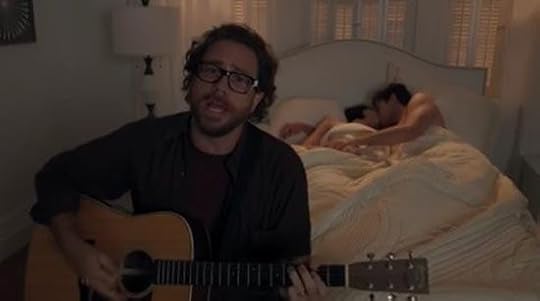
Braindead — CBS
A show that lived and breathed on insanity and otherworldly silliness, Braindead was one of those shows that could put you in a good mood no matter what kind of day you were having, and aside from the fun atmosphere and compelling cast (most notably Tony Shalhoub’s quirky Red Wheatus), a lot of the credit goes to the creator’s knack of not only singing the “previously on” segments that open each episode, but always doing something different and creative so as not to become rote or mundane. For example, in one of the most amusing segments, the narrator becomes so utterly confused by what’s happening with the plot, he decides to recap an old episode of Gunsmoke instead. That ingenuity and randomness was the cherry on top of the most unique, creative and ridiculous show of the season. (And, in some ways, made me miss the equally quirky musical Galavant!)
Best Doppelgänger: Barry Allen, The Flash
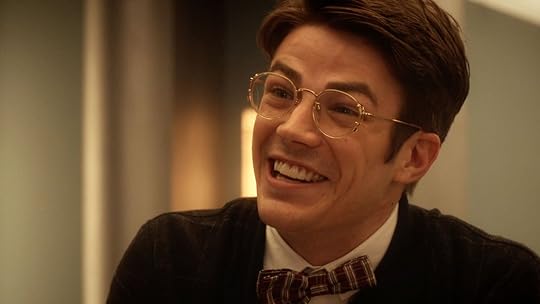
The Flash — CW
After losing Katherine on the Vampire Diaries (and all of second earth on Fringe), it was awesome to see Barry Allen (Grant Gustin) jump to Earth 2 on The Flash and get to meet his much nerdier self. Earth 2 Barry was incredibly funny to watch simply because he was the complete opposite of his doppelgänger, and you could tell that Gustin was having a blast getting to play this new version of himself. Let’s just hope Barry’s decision to rewrite history doesn’t keep us from getting to head back to Earth 2 and hang out with him again.
This season’s most noticeable trend: The non-law enforcement recruitment

Blindspot — NBC
Four shows this season brought us, in varying degrees, people of authority or law enforcement turning to civilians to help solve cases. It’s not an original idea, as many procedurals use this device to control their narratives, but I’m not sure there’s been one season that’s had so many premiere at the same time. Minority Report gave us a pre-cog (Stark Sands) helping a detective solve crimes before they happen; Limitless provided the FBI with someone (Jake McDorman) immune to the side-effects of the mind-altering drug that allows him the ability to become the smartest person in the world; Blindspot sent an ex-Navy Seal (Jaimie Alexander), completely erased of any memory and tattooed with clues to potential crimes, into the lion’s den; and in a lesser extent, The Player had a bleeding heart cop (Philip Winchester) join a team of Vegas bookies who place bets on whether “the player” would be able to succeed in solving crimes. What happened to the days when cops actually did the job they’re paid to do without needing the help of enhanced individuals? Then, not to be outdone, everything switched mid-season. Instead of the cops recruiting non-law enforcement personal, enhanced individuals decided to just horn in on the investigations… and in the process gave us a couple of surprising new shows in Lucifer and Second Chances.
Best Series Resurrection: Nashville

Nashville — formerly of ABC
Just before the networks took center stage to announce their fall 2016 lineups, ABC took the ax to many of its shows, including fan favorite Castle and upstart The Muppets. But the termination that hit a lot of super fans hard was cult favorite Nashville‘s farewell song. Luckily, CMT quickly scooped up the rights and moved forward on producing, at the very least, a fifth season. Whether this will wrap things up in a nice little bow or continue on for many more years is still to be determined. But to know that the little show that could will be getting one more chance to sing is music to many fan’s ears.
Most in need of security: Police stations
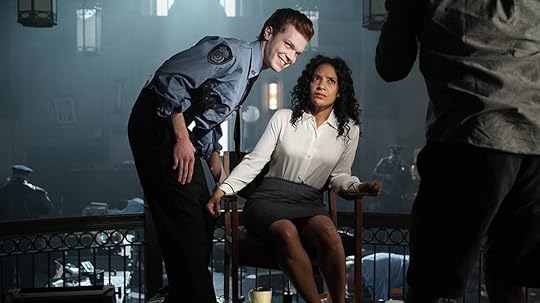
Gotham — ©2015 Fox Broadcasting Co. (Cr: Nicole Rivelli/FOX)
This season saw several police stations get breached early in their runs. On Arrow, Star City police station was once again attacked; In Haven, a troubled person wiped out the police station with his ability to cause earthquakes; and on Gotham, the crazy team of insane Arkham breakouts, led by the fascinating Cameron Monaghan as the faux Joker, ransacked GPD, wiping out half the force, including the captain. It seems like those who are supposed to protect and serve should begin by protecting themselves from the rabble that may infiltrate their own homes first.
High Integrity Award: Masterchef

Masterchef — FOX
Reality shows are in some ways scripted; or at the very least, manipulated to add to the tension. Rules can bend for a “character” that producers feel may bring more viewers to the table, so to see Masterchef stick so closely to the rules and give Andrea the boot because she was a mere three seconds late bringing her plate to the front for judging, even though she had the best plate of the night, shows that the producers refrain from setting precedent by giving anyone an exception. (Then again, only a few episodes later, Gordan Ramsey gave David a second chance after he let his pettiness get the best of him and walked out of the competition, which pretty much negates this whole thing… maybe. I don’t know. It’s your call.)
Best 90s TGIF homage: Mr. Robot
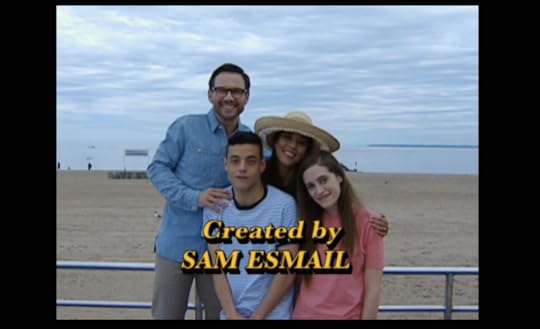
Mr. Robot — USA
After Elliot (Rami Malek) hacked into a fellow criminal’s (Craig Robinson) website to see what his operation truly was, he got the living crap beat out of him and then thrown into a shady basement. During his recovery, his alter ego, Mr. Robot (Christian Slater), transported Elliot to a world of 90s sitcoms, complete with laugh track and a cameo appearance by ALF. The homage was spot-on with every detail, which included a 4:3 aspect ration and an awesome credits sequence that made me feel nostalgic for shows like Family Matters and Perfect Strangers. The surreal experience is given a shot in the arm by making Elliot aware of the whole idea. It was a shame the segment only lasted fifteen minutes. Nonetheless, it was good while it lasted.
Best Reaction: Emma Swan, Once Upon A Time

Once Upon A Time — ABC
In an episode showcasing Rumplestiltskin’s (Robert Carlyle) wife, Milah (Rachel Shelley), giving us more intel on her first meeting with Killian (aka, Hook; Colin O’Donoghue) and how she treated Rumplestiltskin before he became the dark one, the best moment came when Milah met Emma (Jennifer Morrison) for the first time. Rumplestiltskin mentions that Emma has had a relationship with both Killian and Baelfire (Michael Raymond-James), to which Milah pronounces, “So you’ve had a relationship with both my ex-lover and my son?” The look on Emma’s face was priceless.
And with that, we close out the 2015-2016 season. Come back next year for more chaotic television awards.








September 18, 2016
Chaos Breeds Chaos 2016 Television Awards – Part 2
You’ve seen some of the more prominent awards (read Part 1), now let’s move onto some of the specialty awards.
Coming Into Its Own Award: Girl Meets World

Girl Meets World — Disney Channel
As the second season of the continuation of a beloved 90s sitcom continued, Girl Meets World started to find its voice without the old cast getting in the way. Like Farkle (Corey Fogelmanis), who matured into something better as he grew older, so too has the show started to mature along with its cast. Though I still feel that a lot of the writing is forced — that is to say, the lessons aren’t as organic as they were on the original show — as Girl Meets World grows, its finding its way a lot more, culminating in a three-part episode that showed it wasn’t afraid to reach deep for emotions. As Riley (Rowan Blanchard) and Maya (Sabrina Carpenter) started exploring their feelings for each other as well as for their shared love of Lucas (Peyton Meyer), the show wasn’t afraid to stop mining for laughs and develop the drama in a creative, more realistic way. If its true that the show will continue to evolve into more dramatic fare and “real issues” that look to capture those strong moments while still being funny and sweet, then I’m excited to see what they’ll continue to do as season 3 progresses.
Best Twist: Heroes Reborn
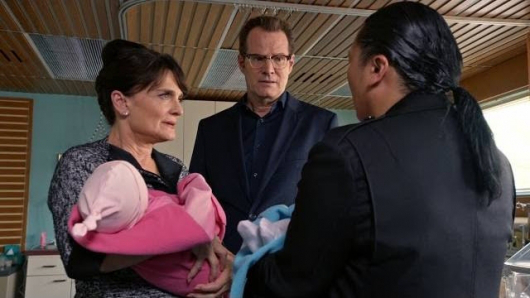
Heroes Reborn — NBC
The resurrection of this once cult show (at least in its first season, before it was derailed by its own self-indulgence) gave us a slow burn introduction to new breed of Evos (that is, humans who have evolved to acquire enhanced powers). But after a devastating terrorist attack on an Evo convention sent HRG (aka Noah Bennett (Jack Coleman)) searching for answers about the attack and the loss of his daughter, Claire (Hayden Panettiere), we meandered through a series of less-than-stellar story arcs. Then, Noah talked time-traveling Hiro (Masi Oka) into taking him back to that fateful day. The two-part episode not only answered almost every question the show had posed thus far, but it dug its claws into the mythology, revealing that Claire died giving birth to twins, who would turn out to be Tommy Clark (Robbie Kay) and Malina Bennett (Danika Yarosh). The entire idea brought back the fascination of that first season vibe and made the show worth watching once again.
Most Surprising Death: Norma Bates (Vera Farmiga), Bates Motel

Bates Motel — TNT
The end of the 2015-2016 television season was not kind to a lot of its actors. First, Charles Pike (Michael Beach) put a bullet in the most established (and first revealed) grounder, Lincoln (Ricky Whittle), on The 100; then Laurel Lance (Katie Cassidy) was sent her pink slip on Arrow; Abbie Mills (Nicole Beharie) saw her final dance on Sleepy Hollow; and The Originals snuffed out not one but two(!) of its original cast members — Klaus’s (Joseph Morgan) on-again-off-again love interest, Cammie (Leah Pipes), and teenage witch Davina Clair (Danielle Campbell). All of these deaths were in some form or another shocking (I didn’t include The Blacklist‘s Elizabeth Keen (Megan Boone), as she didn’t really die… as expected), but none could have been more shocking to this guy than Bates Motel‘s Norma Bates, not because it happened — after all, it was always meant to be — but because it happened so soon. I always expected that Norma would meet her demise in one of, if not the last episode of the series, thus setting up what would become Norman in Psycho. But lo and behold, the creative team decided to end her life in the second to last episode of its killer fourth season, setting itself up for a very intriguing season 5. Freddie Highmore already does a terrific job channeling Vera Farmiga; now we get to see how he handles mother while she’s rotting away in his basement.
Worst Milestone Episode: The Big Bang Theory

The Big Bang Theory — CBS (All Rights Reserved)
I am a big fan of The Big Bang Theory, and have been since its infancy, so I expected a lot when it came to their 200th episode. I’m not saying the episode was bad; there were still plenty of laughs to be had, as well as some touching and sentimental anecdotes as the gang celebrated Sheldon’s birthday. But there seemed to be something missing throughout the entire thing, as if the writers somehow couldn’t figure out how to celebrate their own milestone. Rather than returning to the show’s roots and delivering a comically genius bit of silliness, sarcasm and tight writing, they chose to slide by and hope that fans didn’t notice. I did.
Oddest premise that actually works: Lucifer

Lucifer — ©2016 Fox Broadcasting Co. (CR: Bettina Strauss/FOX)
At first glance, Lucifer leaving Hell to hang out on the surface and join forces with a by-the-book detective seems inane and stupid. Little did I expect that Tom Ellis’s personality could be so magnetically captivating. Ellis grabs your attention with every word that oozes from his mouth — it doesn’t matter what he says, it all sounds so glamorous and important. Then to witness a character like his, who not only doesn’t try to hide his identity, but flaunts it every chance he gets, is fun and exciting. Add on top of that a chemistry with Lauren German’s Detective Chloe Decker (not to mention the rest of the cast, which mix and blend together in a spicy stew), and you get one high-energy, amusing, entertaining buddy-cop show that’s so much more than you’d ever believe it to be.
Most blatant attempt to capitalize on previous success: Minority Report

Minority Report — FOX
About halfway through the first episode of Minority Report, I couldn’t help but feel a slight hint of deja vu. Here we had a black female cop teaming up with a white male who has information she can use to solve recent crimes. By the end of the episode, she has all but offered him a consulting position in the police force, making sure to hide his true identity from all of those involved. Sound familiar? It should. Minus the time-traveling aspect, it’s pretty much the same premise as Sleepy Hollow, which hit big for FOX two years ago. So the studio heads did what they could to recreate that success, but lightning is very hard to manufacture. Add in the fact that this takes place a few years after the events in the Steven Spielberg/Tom Cruise film of the same name, Minority Report felt more like a copy than anything remotely original.
Worst Farewell: American Idol

American Idol — FOX
American Idol was a juggernaut for FOX, helping raise its audience extensively to the point it was able to play with the Big Three. So it’s a shame that FOX completely screwed their baby with a shortened season that saw contestants booted off faster than they do on The Voice and a finale episode that gave this year’s top ten the shaft. Instead of nurturing and supporting the show that helped change the television landscape, the entire season felt as if FOX couldn’t get rid of their drunk uncle fast enough, showing very little respect to the contestants and their fans. The judges didn’t help, as they slept walked through pretty much the entire thing. Yes, the finale episode was terrific, but it should have been a completely separate episode, allowing this year’s top ten one last chance to show America why they were chosen to participate in the first place (and maybe get to sing with a celebrity they admire).
Characters in need of a spinoff: Maya Hart (Sabrina Carpenter), Katy Hart (Cheryl Texiera) and Shawn Hunter (Rider Strong) from Girl Meets World

Girl Meets World — (Disney Channel/Ron Tom)
From the first time Rider Strong made an appearance on Girl Meets World, the chemistry between Maya and Shawn has been electric. Pairing him with Maya’s mother was also a smart move (sorry Angela fans!), and now that they’re officially married, should Michael Jacobs and Disney decide not to renew Girl Meets World for a fourth season, I’d love to see them spin this family off into their own series. Now that would be pure magic.
Actor who’s better than the show: Henry Ian Cusick on Rush Hour
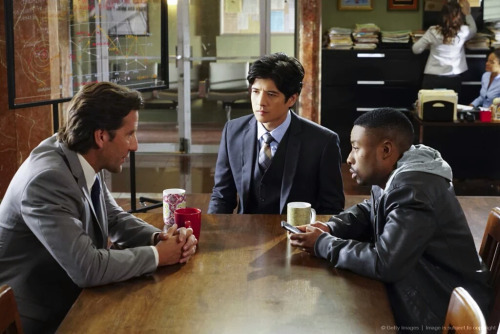
Rush Hour — CBS
In the extraordinarily poor remake of an excellent film, there were a couple of actors that had no reason being present in such recycled tripe. The most egregious was Henry Ian Cusick, who’s such a good actor, it was clear he reluctantly lowered his standards to do someone a favor. Luckily, Cusick only appeared in the pilot episode, but next time, Henry, skip the trash and stick with the thought-provoking material you’ve elevated with your kinetic wonder.
Come back tomorrow for the last of the 2016 television awards, including the best doppelgänger, the most noticeable trend and the best end to a long-gestating story arc.








September 17, 2016
Chaos Breeds Chaos 2016 Television Awards – Part 1
The Emmy’s are back and with it, the Chaos Breeds Chaos Television Awards. For those unfamiliar with these awards (see also the 2014-2015, 2013-2014 and 2012-2013 awards), I’ve spent the entire calendar year (mid-September 2015 to mid-September 2016) watching as much television as my brain (and tastes) would allow, compiling a list of all the ups and downs of the 2015-2016 season. (The biggest surprise? The CW didn’t take home the prize for Best New Show!) This list of course only covers those shows I watched, so if you’ve seen something over the course of the season that you believe should be on the list, it may be missing simply because I don’t watch that particular show. Then again, it just may be omitted because I didn’t think it awesome enough (or cringe-worthy enough) to include. So please, leave your comments and choices in the comments section at your leisure. Now, without further adieu, here are the best, worst and most bizarre of this year’s TV offerings according to me, your avid TV watcher.
Best New Series: Preacher

Preacher — AMC
How do I describe Preacher? If I had to give it the old college try, I’d say it’s an absurdly weird supernatural, modern-day western that plays by its own rules. As someone who was not at all familiar with the graphic novels the show was based on (and with Seth Rogen helping to run the show behind-the-scenes), I wasn’t sure what to expect going in. But from the first minutes of the first episode when a preacher explodes all over his congregation, I was hooked on the show’s brazen absurdity. The dialogue was consistently crisp, the characters wholly three-dimensional, and the story lines remained on point with nary a plot hole to be found. Being able to watch something that doesn’t care what its viewers think, following its heart down the rabbit hole of its own madness to the brink of alienation and doing so with delicate precision, was a refreshing change of pace. Kudos to all involved on making such a terrific show (that isn’t on the CW) shine brighter than an angel’s return from death.
Worst New Series: Scream Queens

Scream Queens — FOX
In opposition to Preacher, within the first few minutes of watching Scream Queens, I knew right away this show wasn’t going to be my cup of tea. It was when they revealed their opening credits sequence that I understood why. I know a lot of people enjoy Ryan Murphy’s work, but I have never been able to make it past an episode of anything he’s created (The People Vs. O.J. Simpson may be an exception, but he was only a producer on that mini-series, as opposed to one of its creators). I’m not sure what it is, but Murphy’s writing style and visionary tendencies just don’t jive with mine, and as I sat there, being tortured by the first hour of the two-hour premiere, I couldn’t help but feel everything was so manufactured — and in a bad way. Every choice, from the characters and dialogue to the costumes and tone, were all wrong, and I couldn’t help but feel bad for Jamie Lee Curtis and Abigail Breslin (and to a lesser extent, Emma Roberts), who are all way better than the material they were given. Now I understand this was supposed to be a campy fright fest that made fun of horror and “mean girls” cliches, but there’s a right way to do that (see Wes Craven’s Scream), and this wasn’t it. It was too over-the-top, too forced and too in-your-face to allow me to feel any compassion for anyone, or even the ability to become invested in any character. By the end of that first hour, I had to wonder if being mowed over by Satan would be better than watching the second hour.
Weirdest New Show: Crazy Ex-Girlfriend

Crazy Ex-Girlfriend — CW
I’m not quite sure what to make of the new CW show, Crazy Ex-Girlfriend. At times it was quite cute and relaxing, and at other times was so over-the-top and bizarre, it was like watching a train wreck you can’t turn away from. Rachel Bloom is sweet and lovely as the title character, who moves to West Covina, California so as to be around a boy (Vincent Rodriguez III) she had a fling with several years earlier, but everyone else around her never seemed to find the right groove to sit in with her to make it all work. And don’t get me started on the songs, which came off as so amateurish, it seemed like a six-year-old wrote them after binging on candy and Mean Girls. And maybe that’s the point, and maybe it’s because I’m not a girl… but whatever it was, I just didn’t get it. I wanted to, and there were certainly moments that held my attention long enough to keep watching, but after the third episode, the crazy outweighed the sanity too much not to break up with the show.
First Show To Die Award: Wicked City

Wicked City — ABC
One of the last shows to premiere this past fall was also the first to die (officially). With networks taking a more comforting approach to the ax this season by reducing episode orders rather than officially canceling their poorly rated shows (see Minority Report, The Player, and Blood and Oil to name a few), Wicked City was the first show to be removed from the schedule after just two episodes, sending the bland characters and sexualized serial killers to their graves without a second thought.
Series that shouldn’t have been this good: Limitless

Limitless — CBS
I’ll be completely honest with you — I wasn’t the biggest fan of the movie Limitless. I found it to be somewhat derivative and a slow burn that never really found its voice. I’m probably alone in that assessment, but there it is. So when I heard they were developing a series around the film, I didn’t have high hopes for its success. But after a decent debut, the show found a strong voice, doing everything it could to buck the normal procedural trend while remaining true to its formula. Jake McDorman as lead character, Brian Finch, is amusing and relateable, fun and annoying, playing off of the entire cast like creamy butter to create an atmosphere that feels like home. The show fell into its own unique voice quite nicely, didn’t pander to its audience and wasn’t afraid to try new things, making each episode a little different, a little quirky and a little exciting. It’s a shame not as many viewers found this show in time to save it from a heartbreaking demise.
Series that should have been better: The Muppets

The Muppets — ABC
I’ve been a fan of the Muppets for as long as I can remember. I’ve watched all of their movies and television iterations (except for The Muppet Show, which aired before my time), so after their recent resurrection in theaters, I was excited to see them back on the small screen. Was the show awful? Far from it. There were multiple hints at a show that could have been one of the best on television. The problem was, there wasn’t any focus and there were too many jokes that didn’t quite land right. When the original showrunner was replaced in the latter half of the season, it got a lot better, and what made the Muppets shine so long ago came through in much more clever ways. But it ended up being too little too late, which is a shame, because by the last few episodes, The Muppets had finally hit the stride I’m sure the producers were hoping for when the fall season race began.
Best New Character: Jess “Mama” Sallander (Luis Guzman), Code Black

Luis Guzman as Jess “Mama” Sallander (Code Black)
From the moment Luis Guzman appeared on screen teaching the new residents of Angels Memorial Hospital, he walked away with the Best New Character prize. Guzman has been around Hollywood for a long time, giving voice mostly to sidekicks and comic relief characters, and his time on Code Black is no different. But as the head nurse at a hospital that sees more influx of emergencies than any other hospital, he isn’t just a nurse, he’s the brains and the heart to an otherwise chaotic work environment. He is your mama, and with that comes the trust and the care and the hard hand that grounds the chaos into peace and serenity.
Best New Character in an Established Show: Jerome (Cameron Monaghan), Gotham

Cameron Monaghan as Jerome (Gotham)
When he first appeared in season 1 of Gotham, Jerome was painted as the heir to the Joker throne. So when the showrunners announced they would be focusing on the villains in season 2, knowing Jerome would be back for multiple episodes was exciting to hear. And in his very limited time, he didn’t let me down. His maniacal laugh and insane antics lit up the show, overpowering the less than stellar story lines that muddled the first half of the season. Did he sometimes go a little too over the top? Sure, but that was sort of the point, and though I would have liked to have seen him given more screen time than he was actually allowed due to the other Arkham Asylum inmates that got under your skin, he made every moment count. And when it turned out that Jerome wasn’t the Joker of lore, and simply the inspiration for what was to come, that twist would become one of the most surprising of the season.
Come back tomorrow for more television awards, including the best twist, the most surprising death and the worst farewell of the 2015-2016 season.








August 29, 2016
IndieBook Review – Where Have All the Elves Gone?
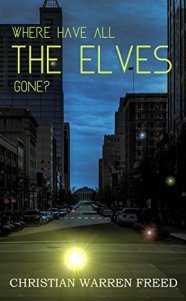
Where Have All the Elves Gone? — A Novel by Christian Warren Freed
One of the old adages for a majority of literary and creative writing “gurus” is to write what you know. This can take on different meanings with different people, but to me it means write for your passion; it means write for yourself first and the public later. By doing so you’re able to imbue your characters with the love, the pain and the life experiences that you’ve personally had, which in turn allows them to live and breathe through you while having the freedom to add the wild ideas you’ve always wished to explore as a scintillating garnish. Christian Warren Freed, author of Where Have All the Elves Gone? gives this wise-old adage an interesting spin by not only giving his characters backstories that may correspond in certain ways with his own, but creatively compounds the idea by turning the life we know into something far from what we think it to be.
Daniel is a former army grunt who lives a mostly quiet life as a successful fantasy novelist. But when his long-time agent rejects his newest novel, Daniel’s world gets flipped upside down, right-side up, shaken and stirred. Unable to take no for an answer, Daniel heads into the city to talk his agent into reconsidering only to realize that the fantasy-based creatures — you know, the elves, trolls, gnomes, wraiths and of course dragons — he once thought were only part of his wild imagination, are real and living day-to-day lives among us. The shock to the system would have been enough for most people, but Daniel is given no time to process the situation before being tasked to return a mysterious box to the King of the High Elves and become a significant player in the war between two warring elf factions.
That’s a very condensed synopsis of what happens in the story, but to add anything more would only confuse you. There are many levels of subplots, hidden agendas, backstabbing and character fluctuations all squeezed into a meager 270 pages that it becomes almost hard to follow. It’s basically clear by the end of the novel what was happening, but up until the last couple of chapters, trying to understand even the most simple aspects behind the plot is frustrating, to say the least. Most of this is due to the way the narrative is written, with many intentionally kept secrets without enough intrigue. Even the intentions behind the main subplot — the fight between Alvin and Morgen, the leaders of the elves, who each want a different level of control — seems to bounce back and forth like a rubber ball in an tightly enclosed space. The ideas are there, but the way they’re expressed isn’t nearly as strong as it needed to be.
And it’s not just the plot that can’t find a solid footing. Character motivations seem to rise and fall with whatever the situation may entail, and though this is okay for a few of the minor characters who don’t have any loyalties to any one side, it hurts the integrity of the characters that should have a solid foundation in their decisions. The most egregious culprit of this is Daniel’s wife, Sara, who wavers between meek damsel-in-distress and gung-ho warrior powerhouse (with a little incensed wife in each). I’m not sure if I would have minded this double-sided characterization had we gotten to know Sara in more depth at the beginning of the novel. Other than a quick hello in the first chapter (and a few tidbits thrown about throughout the first half of the book) we know absolutely nothing about this woman to warrant any of what she’s able to accomplish in the latter half of the book. Because of this, the tensions that arise and the way the couple interact with one another falls flat against the overall backdrop.
Instead, we’re given a serious case of info-dump in the first chapter, information that could have been better served to have been sprinkled throughout. And some of it is, leading to a very repetitious narrative (how many times do we have to be reminded that until today, Daniel thought elves were only a figment of his imagination?) that tends to gloss over many aspects that deserved more time to develop. For instance, one of funner character’s dies about halfway through the book with nary an explanation for why, or even any response from our main line of heroes. He’s just dead.
But even with all of its flaws, the story tends to flow quickly, mostly because of Freed’s ability to write action sequences. Having been a soldier in Iraq and Afhganistan, Freed clearly understands the battlefield and how war itself operates, and that knowledge shines through on the page. Whenever there’s a battle, no matter how big or small, he makes it feel as if you’re in the heat of the battle with him. It’s clear this is where Freed’s real passion lies. Not that he isn’t passionate about the fantasy side of his books, but when he’s revealing all aspects of the fantasy world, everything, including a lot of the dialogue, feels stilted, as if Freed is a little lost and unsure. It’s only in those very specific battles that Freed feels so engaged, it’s hard not to be absorbed into the honesty that’s missing from the fantasy at the heart of the book.
My Grade: B-

Christian Warren Freed
Christian W. Freed was involved in three tours in Iraq and Afghanistan over the span of 20 years of active duty before devoting his time to writing and his family, with whom he lives Raleigh, N.C. He currently has 16 military-fantasy novels in print, several under contract, and has written many pieces for anthologies and magazines.
Check out all of Christian’s social media platforms:
If you are an independent author and would like your book reviewed, let me know in the comments section with a link to where I can purchase the book. If I find it intriguing, and it’s something I think I’d like, I will purchase a copy and add it to my reading list. I will be doing one independent book review per month, so not all requests will be accepted.








August 23, 2016
Movie Mayhem -Pete’s Dragon & Ben-Hur
If you’re a follower of my blog, you’re probably aware that I am not the biggest fan of remakes, reboots and all the rest. I’ve previously railed about Hollywood turning their blockbuster machine into a Xerox machine, leaving most original content to wallow and “impress” in the specialty markets and film festivals, testing the waters before going wide. (One of those films, Hell or High Water, is a remarkable film with a great cast; having made over 3 million thus far in its slow burn release schedule, had the studios opened this wide from the jump, it more than likely would have made its budget back and then some opening weekend.) Where the real problem lies is when executives take a look at their company’s back catalogue, see dollar signs with titles that originally made a lot of money and think they can capitalize on that success with an inferior retread instead of looking for those titles with a brilliant premise but which failed because of horrible execution. In other words, instead of attempting to improve a weak product, they harm an already strong property for the sake of the bottom line.
In the last two weeks, there have been two remakes released to theaters. One is an enigma as it falls into a separate category that I will get into in just a second. The other, Pete’s Dragon, is the perfect example of a film that was in desperate need of an upgrade, taking the original idea and improving on it tenfold.

Ben-Hur — 2016; Directed by Timur Bekmambetov; Starring Jack Huston, Toby Kebbell, Nazanin Boniadi, Pilou Asbaek and Morgan Freeman; Pete’s Dragon — 2016; Directed by David Lowery; Starring Bryce Dallas Howard, Robert Redford, Oakes Fegley, Oona Laurence, Wes Bentley and Karl Urban.
The original 1977 film about a young orphan and his best friend (who happens to be a flying dragon who can disappear) was a poorly executed mess of a film. The script, the acting, the effects and the music (this was in Disney’s live-action musical heyday) were all scrapped together as if everyone involved had better things to do. There was no love or passion put into this product and it shows in its execution, so this was the perfect opportunity to go back to the drawing board, examine where it went wrong, and produce a product that shines the way it was originally intended to shine.
Relative newcomer Oakes Fegley is incredibly engaging as Pete, an eleven-year old boy who lost his parents in a car accident, then befriends a dragon in the woods next to a small idyllic town. Pete names the dragon Elliot (based on the name of a character in a storybook, which is the only remnant left from his past — and already the story has more emotional resonance than the entire original film) and the two share a relationship that bounces from boy and his dog to loving brothers. One day, Pete stumbles upon Natalie (Oona Laurence), the daughter of Jack (Wes Bentley), a lumber production plant owner currently contracted to tear down sections of Pete and Elliot’s home. Jack and his park-ranger girlfriend, Grace (Bryce Dallas Howard), take Pete back home, causing Elliot to attack Jack’s brother (Karl Urban), an understandable reaction based on fear of losing his home and his best friend.
Fegley plays his side of this separation with a soft patience. He wants very bad to get back to Elliot, but also understands the need for human connection, one of the main themes that run the entirety of the film. Though I would have liked to have seen more done with the relationship between Grace and her father (Robert Redford), what director David Lowery (along with screenwriting partner Toby Halbrooks) is able to accomplish with this theme is quite impactful. The climactic scene, which shows how much Elliot wants to protect his family, but also understands when that family is hurting, sums up the bond between these two characters perfectly.
Sadly, on the other end of the spectrum is the remake of the 1959 classic, Ben-Hur. Now I said this remake is an enigma, and that’s because both films were based off of “Ben-Hur: A Tale of the Christ,” a novel by Lew Wallace published in 1880. I don’t mind as much when a novel is adapted, as different interpretations of that novel can yield different results. And it turns out, this new iteration is the fifth filmed adaptation (if you count the 2003 animated version) of this particular story. So, if you consider this a remake of the 1959 classic, then you would have to consider that a remake in and of itself. But who really knows about those other films, much less the book?
With that said, I actually went into this new version blind, having never actually seen the Charlton Heston-led version (except for the chariot race; I mean, who hasn’t seen that). For example, although I knew the story of Judah Ben-Hur (Jack Huston) battling the Roman empire in the field of sport took place during Biblical period, I had no idea that Ben-Hur’s story intersected with the rise and fall of Jesus in different ways. It wasn’t off-putting by any stretch, just unexpected.
I will say, based on having a fresh pair of eyes going in, there are a few highlights in the film that make this new version worthwhile — in particular, the scene in the galleys. When a boy Ben-Hur was nursing back to health attempts to assassinate Pontius Pilate (Pilou Asbaek, resembling Joshua Jackson far too closely), Ben-Hur takes the fall and is sent to work as a slave in the galleys of a Roman ship. At one point, the fleet goes into battle, and director Timur Bekmambetov films the entire battle inside the vessel. It’s a breathtaking sequence that puts you in the mindset of what it must have felt like for the prisoners at that time.
The scene happens around the half-way point of the film and marks a turn in tone and pace for the better. The first half of the film is sluggish, to say the least, as they set up the characters and the motivations that will drive the second half of the film. There’s nothing really captivating about anything that happens until Ben-Hur is sent on his quest for revenge against his best friend and brother, Messala (Toby Kebbell). Only then does the film finally become engaged, bringing the fire that was delivered in the trailer.
Though only one of these remakes was entirely warranted, both films show a certain pride to their work. It was clear the filmmakers tried to add to the properties that had already been established rather than remake the film for the sake of remaking the film, but only one truly succeeded in that prospect (the aforementioned chariot race was only hurt by the addition of CGI). If more studios followed this formula, remakes probably wouldn’t feel as detestable as they currently do, and since the trend these days seems to be showing signs of fatigue (what with the majority of eyeballs moving to cable and Internet channels that produce fresh, new material), here’s hoping the executives finally take notice and stop relying so much on these retreads and start putting money back to where it should be: originality.
My Grades: Pete’s Dragon: A-; Ben-Hur: B
Take Our Poll
——————————————
Next week, new movies include Don’t Breathe, Mechanic: Resurrection and Hands of Stone. If you would like to see a review for one of these, or any other film out next week, please respond in the comments below.








August 7, 2016
Movie Mayhem – Nine Lives
If anyone was ever to remake The NeverEnding Story, I would bet dollars-to-donuts Christopher Walken would play the owner of the bookshop Bastian steals from. Alongside his many supporting roles in an eclectic array of films, Walken has somehow become the go-to actor to play “the mystical shopkeeper.” Okay, yes, it’s only been twice now, but in both Click and the new cat-tastrophe (oh my gah… I can’t believe I just did that!), Nine Lives, it becomes clear Walken is a little too bemused by the parody of himself. There’s no life left in his once Oscar-winning persona, a noticeable problem that infects everything else around it. There’s something to be said for an actor elevating a film that seems otherwise thrown together, but when it feels like he — alongside Kevin Spacey, another professional stalwart that doesn’t belong anywhere near a film like this — isn’t even attempting to give 110%, that not only affects those around him from giving their all, but it telegraphs to the viewer that the film isn’t worth their time.
A good example for this is The Fifth Element, a film that could have been a disaster of Jupiter Ascending proportions had it not been for every single actor just letting loose and going for it, delivering terrific performances as if the film was poised to win every Oscar category. Of course, the actors involved had the advantage of working with a well-written script. Unfortunately, Nine Lives can’t hold up on that front either.
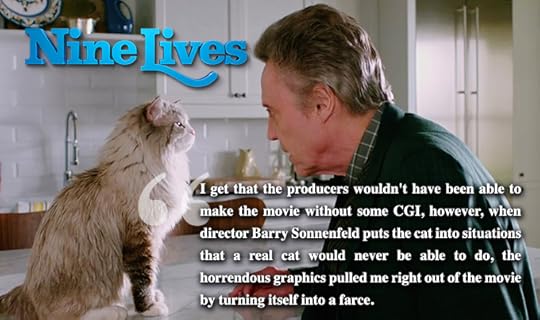
Nine Lives — 2016; Directed by Barry Sonnenfeld; Starring Kevin Spacey, Jennifer Garner, Christopher Walken, Robbie Amell, Cheryl Hines, Mark Consuelos and Malina Weissman
Basically what amounts to The Shaggy Dog for cat lovers, Tom Brand (Spacey) is a billionaire tycoon who *gasp* spends all of his time at work attempting to build his ego… er… the tallest building in the United States, all but ignoring his patient trophy wife, Lara (sorry Jennifer Garner), and two kids — grown-up David (Robbie Amell) and eleven year-old Rebecca (Malina Weissman). Rebecca’s one birthday wish is a cat, so when Tom reluctantly decides to grant that wish, some mystical force that’s never truly explained diverts him to a scary back-alley pet shop owned by Walken. But before he can get home to surprise his daughter with her new feline friend, Tom is called back to the office where he accidentally falls off the roof and (miraculously) survives. It’s this incident that deposits Tom’s consciousness into the cat while his body is left to wallow in a coma. And according to Walken, Tom only has until his body gives up to make amends for his absence.
And that’s just the tip of the iceberg. There are several subplots woven into the film, most of which go absolutely nowhere. The secondary plot involves a takeover of Tom’s company by a ridiculously smarmy employee (Mark Consuelos) who essentially wants to see Tom die so that he can convince the board members to allow the company to go public, a plan David tries desperately to thwart in Tom’s absence. Though that does come to a satisfactorily absurd conclusion, there are a couple of other C-plots, including one involving a possible affair between Lara and her realtor, and one surrounding the bullying of Rebecaa at the hands of Tom’s ex-wife’s daughter (Talitha Bateman), that go absolutely nowhere. In a well-written script, both storylines would have been used to strengthen Tom’s journey and add depth to the supporting characters, but here, they simply feel like unnecessary fodder to pad the run time. It’s a shame, because I would have liked to have explored these ideas more and to see how these incidents help Tom understand why his presence in their lives is so important. Though the filmmakers intend for this to be true, it just isn’t, and because of that, none of the characters grow, ending the film at pretty much the same place they were at the beginning.
But none of that compares to the incredibly weak CGI. There are a lot of very cute and adorable moments that involve… the real cat. You know, the one that isn’t as fake as a second-grade science project. I get that the producers wouldn’t have been able to make the movie without some CGI, however, when director Barry Sonnenfeld puts the cat into situations that a real cat would never be able to do, the horrendous graphics pulled me right out of the movie by turning itself into a farce. Because the scenes that included a real cat (or at least the ones that felt like it was a real cat) were fun and natural, had Sonnenfeld chosen to keep all acts as true to a real cat as possible, I believe it would have kept the film from devolving into something a six-year-old would scoff at.
Spacey has made a career out of playing the hard-ass superior, mainly because he does it so well. But here, even though he isn’t technically on screen for the majority of the film, it almost feels as if he, like Walken, is consciously delivering a parody of that persona rather than actually attempting to generate something more from that base. This lack of interest trickles over into the supporting cast, including Cheryl Hines and Amell, who follow the lead of our two major players (and to a lesser degree, Garner) and turn in performances that give off a vibe that this film is somehow beneath them.
And if that’s truly the case, I have to wonder why they took the job in the first place, and why Sonnenfeld, an acclaimed director in his own right, would have signed on to do a film that pretends to have fun but in the end is simply going through the motions. I’m reminded of an episode of The Big Bang Theory when Penny agrees to make a sequel to her gawd-awful ape movie. At one point she asks the director to try a scene again, and he balks, telling her there’s no point since this is just part of his deal to secure funding for something better. Nine Lives is essentially that movie — the movie everyone agreed to do as part of a contract that would lead them to something they actually wanted to do. But had they found a way to truly capture the magic of the idea, Nine Lives could very well have been a harmless delight instead of just an unforgiving yawn.
My grade: C-
Take Our Poll
——————————————
Next week, new movies include Pete’s Dragon and Florence Foster Jenkins. If you would like to see a review for one of these, or any other film out next week, please respond in the comments below.








July 29, 2016
IndieBook Review – Indiot
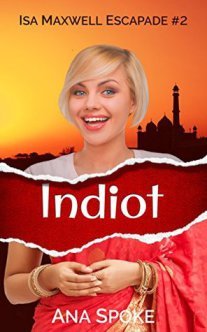
Indiot is the follow-up to Ana Spoke’s debut novel, Shizzle, Inc., chronicling the hijinks of Isabella Maxwell, a naive blond who wants nothing more than to change (or help) the world, getting herself into extraordinary circumstances along the way. In Shizzle, Inc., this trouble came upon her mostly by accident, as the world seemed to open opportunities she’d then exploit for her own means, messaging the truth and more often than not, putting her foot in her mouth. In Indiot, the tables turn a bit, as Isabella (or Isa, for short) begins to take hold of the reigns of her own destiny. She still gets into plenty of trouble, but instead of unbelievable circumstances pushing her into various comedic predicaments, her conscious decisions now tend to lead her into trouble — a switch that gives her narrative more reliability than in Shizzle, Inc. It doesn’t feel as if Isa is lying as much about what’s happening, making her adventures more authentic and enjoyable. At the same time, her character seems to grow too much too fast, as if the lessons she learned in Shizzle Inc. have taken root, but have matured faster than an alien baby in a science-fiction movie.
I was pleased to have been a part of shaping Indiot into its final product by offering my feedback to Ana as a beta reader. For those who may not know what that means, a beta reader is someone who reads a rough draft of a novel (usually one that’s been rewritten a few times and is almost ready for final editing) to give feedback in relation to grammatical mistakes, inconsistencies, plot holes or poor character developments that the author themselves have become blind to after having read the story multiple times over. In short, it’s a fresh pair of eyes. I read Indiot for the first time with a very technical eye, looking for those things that may need to be tweaked to create a smoother, more consistent read. With the finished product, I used a much more reader-friendly eye, enjoying the book as a reader rather than nit-picking everything I could nitpick.
Regardless of how I read the book, though, I still have issues, mostly with some of the developments that move Isa through her journey. After receiving an email from an Indian prince seeking money to help get his inheritance (from which Isa will be very well compensated in return), Isa decides to head to India to give the prince the money in person, then use her newfound wealth to help the orphans of the world. But after learning the entire thing was a scam (there’s that naiveté) mid-flight, Isa decides she might as well stay and see a little bit of Delhi. That decision leads to her passport and ID being stolen, sparking her new, very amusing adventures with a bevy of fun, new characters, like the Santa-looking taxi driver Kabir and the friendly-yet-devious Vivian, who becomes the spark plug for Isa to discover her new voice and, in a way, finally learn to grow up.
At first, I wasn’t a fan of that growth as written; it didn’t feel as organic as it should have been. Finding out that the “prince” was a scam so early in the book was one of my initial notes, because I felt that her finding the prince should have remained one of the driving forces that kept Isa in India. To me, what actually drove the narrative didn’t seem to fit with her personality as a character in the same way that motivated her in the first book, making Isa feel like a much different character. But upon second read, I didn’t mind this development (or the events that happen afterward) quite as much. I don’t know if it’s because I already knew what was going to happen, or if it was because some of the notes provided by me and/or Ana’s various other beta readers were applied, but the story as a whole had a much better flow that felt more natural. There are still moments that feel out of place, unnecessary, or wasted — one scene in particular, in which Isa goes “undercover,” has such a great build-up, when the actual event happens… wait? That was it? — however, I was invested in the story more than I was the first time, which is a testament to the author, who not only made the appropriate changes where needed, but stuck to her guns on elements she felt in her heart were true to what she was creating. It’s because of that, I have to admit, that Isa is starting to grow on me as a character.
I will say that, even from the first read, I thought Indiot was overall a better book than Shizzle, Inc. The way Ana writes Isa, giving her such a sweet, lovable voice, draws you in with a compassionate mindset for this flawed, but tenacious character. Though the writing doesn’t always flow perfectly (mostly in the dialogue, which on occasion can seem a bit stunted), the characters are fun, the plot twists are interesting (even when they seem a little cliché) and the lead-up to the next book is well-done and introduced in a nice subtle way that doesn’t overshadow the events of Indiot, but give a nice segue into the next chapter in Isa Maxwell’s disastrously entertaining life.
My Grade: B+

Ana Spoke
Ana Spoke lives in Australia with her fiancee and writes full time, whether that’s continuing the adventures of Isa Maxwell, or using her blog to discuss her experiences with marketing and self publishing.
Check out all of Ana’s social media platforms:
If you are an independent author and would like your book reviewed, let me know in the comments section with a link to where I can purchase the book. If I find it intriguing, and it’s something I think I’d like, I will purchase a copy and add it to my reading list. I will be doing one independent book review per month, so not all requests will be accepted.












